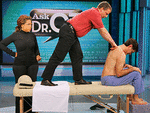
Yoga
What is Yoga?
Yoga is a traditional art form originating in India which is based on physical and mental discipline. Its popularity has spread around the world, with millions of people taking up yoga training or attending yoga workouts to keep fit and healthy and achieve balance in all areas of their life.
Yoga, with its system of yoga poses, yoga balance, yoga exercises and breathing exercises has become highly popular as an exercise form, noted for its ability to promote all-round well-being by losening muscles, increasing flexibility and fundamentally improving posture.
Yoga is also taught as a form of alternative medicine that prevents certain diseases and maladies by aligning the energy meridiens to kepe them open and keeping the prana flowing.
Yoga and RolfingYoga and Rolfing share a common emphasis on posture as integral to well-being, as well as an emphasis on the alignment of the body. In yoga, this comes with yoga poses, yoga balance and yoga exercises which achieve a supple, graceful posture. The emphasis on alignment is seen in yoga balance and the yoga belief in aligning the energy meridiens.
In Rolfing, a Rolfer will continuously seek out a dynamic, creative balance in your body that is quite different from holding it in one rigid postural position that cannot easily accomodate the daily demands of life. Posture, as taught through Rolfing, is a creative, fluid process much like the yoga philosophy. With Rolfing, you move with correct posture, you do not hold. Rolfing will teach you the inherent balance of a properly aligned structure and how to let gravity do the work of providing support. This ultimately improves posture.
How Rolfing And Yoga Supplement Each Other To Achieve Better PostureMany people who do yoga exercises often find that while they are able to do hold the posture of an asana on one side of their body, they are unable to repeat the yoga asana on the other side of their body because they feel additional tension on that side. These tensions arise as a result of structural and posture imbalances in the body. Teachers of Rolf Movement Integration address disruptions in structural balance in the bodies of our students and clients. Rolfing through hands-on manipulation and providing cues and prompts that help you regain your structural integrity. This will help you to effortlessly complete your yoga workout without straining to overcome the inherent imbalances in your body. Through Rolfing session, Rolfers bring out this elongation without effort, which is very important in successfully adopting yoga positions and the posture of the asanas. One of the hallmarks of Rolfing is the attainment of improved posture as a result of surrendering tension and strain, as opposed to learning new ways of working hard, or trying to maintain a good posture. After Rolfing, clients often find that because they have bodies that are more supple, better aligned, and have better posture, they are better able to respond to yoga training or a yoga workout.
Yoga
|

Certified Rolfer®
Vincent Lee
Rolfing was featured in


“Two Hands” 2007 Academy Award. Nominated for documentary film.

Andrew Weil, M.D.
“Good Morning From Dr. Weil.com” An on-line daily newsletter published a health news brief June 25, 2004--“Tip: Is Your Posture Bad? Today’s Tip-Rolfing."
